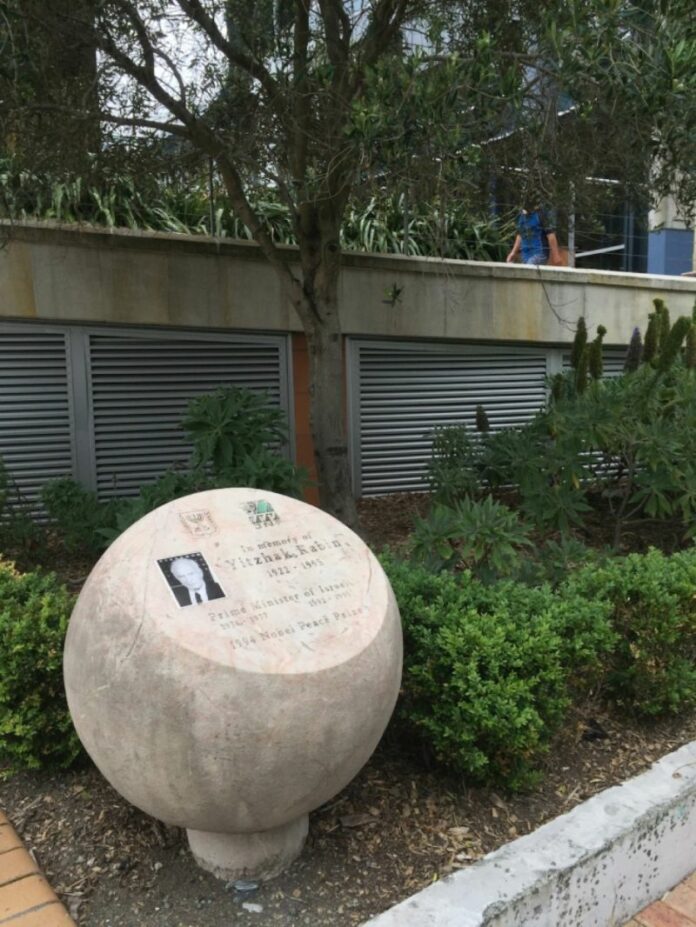In a public square in downtown Wellington, New Zealand, an olive tree stands next to a small stone memorial. Inscribed upon it is a dedication to the late Israeli prime minister Yitzhak Rabin and it is probably the farthest Israeli-sponsored memorial of its kind.
The memorial was installed in November of 2000 by the Jewish National Fund in cooperation with Wellington City Council as a symbol of peace, but even at the time of its dedication it was overshadowed by conflict. Only two months prior, a controversial visit to the Temple Mount in Jerusalem by then Israeli prime minister Ariel Sharon ignited a tinderbox of Palestinian grievances following the failed peace talks at Camp David earlier that year. Violence erupted and both Palestinian terror attacks and clashes between Palestinian militants and Israeli soldiers would lead to the death of over 4,000 civilians and combatants. At the dedication ceremony for the memorial, themes of peace and war intersected as speakers spoke of both the Biblical symbolism of the olive branch as a sign of peace and of the “stormy sea” upon which Israel was presently managing to stay afloat — not unlike the floodwaters of the story of Noah that would give the olive branch its contemporary meaning.
Nine years later, the Rabin memorial in Wellington became a site of scandal during protests over the armed conflict in Gaza. During the demonstrations, a Catholic priest splattered the memorial with red paint mixed with drops of his own blood to symbolize the deaths of Palestinian civilians and militants. When later questioned about their actions, the Wellington Palestine Group (who organized the protest) and Father Gerald Burns admitted that while the vandalism of the memorial was possibly “imprudent” on his part, the site still served as a fitting “object of [their] protest”. They claimed that Yitzhak Rabin represented Israel’s long history of systemic oppression towards Palestinians, with no mention made towards the joint Palestinian-Israeli peace efforts that would earn both him and Palestinian leader Yasser Arafat the Nobel Peace Prize.
On this 27th anniversary of the assassination of Yitzhak Rabin, his memorial at the ends at the earth — as far away from the Middle East as is almost possible — reminds me of the power of the symbol. Even in Israeli society, Rabin’s life serves more as a political talking point than anything else, with politicians either vilifying or praising his memory to garner support from their constituents. This has been especially true in the wake of last week’s legislative elections as politicians on both the right and the left levy accusations against each other for complicity in Rabin’s death, years after his assassination. Others meanwhile have framed his untimely end in their political speeches as the end too of the “disastrous” peace process started by his involvement in the Oslo Accords.
Today I am taking a step back from viewing Yitzhak Rabin in monolithic terms. He was a man whose life as a career military leader and later as a politician juxtaposed both war and peace. He was also a loving husband, father, and grandfather. Rabin is ultimately many things to many people and 27 years on from his death there are still those who seek to ascribe their opinions and agendas to his memory, no matter how varying they may be.
I choose the pathway forward. Rabin’s memory to me is a reminder to pursue peace as you envision it. I believe that by bringing Aotearoa New Zealand and Israel’s tech industries closer together, the shared economic prosperity and increased bilateral relations between private and public sectors that will result will create a brighter future for both countries and set an example for others to follow.
Joey Sacharow is the Israel Director at New Zealand Israel Innovation Hub and a volunteer event coordinator and member of the Kea New Zealand community in Israel.



